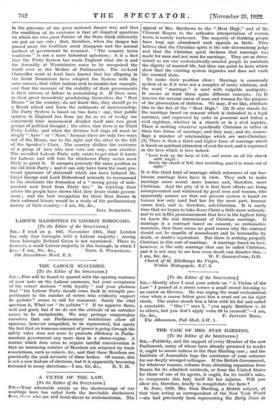A VICTIM OF THE LAW.
[To the Editor of the SPECTATOR.] SIR,—YOUT admirable article on the shortcomings of our marriage laws has called forth the inevitable disclaimers from those who are still bond-slaves to ecclesiasticism. The
appeal of Mrs. Matthews to the " Most High," and of Mr. Clement Rogers to the orthodox interpretation of certain texts, is merely irrelevant. The majority of thinking people have long ago abandoned such appeals as futile. They believe that the Christian spirit is the sole determining judge and that the Christian spirit declares that marriage was made for man and not man for marriage. They are as deter- mined as are our ecclesiastically-minded people to maintain the dignity of married life, but they can point to facts which show that the existing system degrades and does not exalt the married state.
To make their position clear : Marriage is commonly spoken of as if it were not a complex of many relations, and the word " marriage " is used with culpable ambiguity.
It covers at least three quite different concepts. (1) It denotes the natural union of man and woman for the purpose of the procreation of children. We may, if we like, attribute this to the fiat of the " Most nigh." (2) It also stands for the marriage based on consent which is embodied in a legal
contract, and expressed by verbs in praesenti said before a civil registiar, whether in a church or in a civil registry.
There is nothing whatever specifically Christian in either of these two forms of marriage, and they may, and do, camou- flage a number of relationships which are anti-Christian. (3) There is then a third and higher form of marriage which is based on spiritual attraction of soul for soul, and is expressed in the love which is love indeed.
" Love took up the harp of Life, and smote on all the chores with might ;
Smote the chord of Self, that trembling, pass'd in music out of sight."
It is this third kind of marriage which reformers of our bar- barous marriage laws have in view. They seek to make
marriage more moral, more human and, therefore, more Christian. And the pity of it is that their efforts are being misrepresented and withstood by good men and women, who apparently cannot see that our present system is based on human law only (and bad law for the most part, because canon law), and is, therefore, sub-Christian. It is surely time that we began to take Jesus Christ a little more seriously, and to see in His pronouncement that love is the highest thing we know the real determinant of Christian marriage. II marriage is a contract based on consent, as ecclesiastics maintain, then there seems no good reason why the contract should not be capable of amendment and be terminable by death, or death's equivalent. But there is nothing properly Christian in this sort of marriage. A marriage based on love, however, is the only marriage that can be called Christian, and it is not easy to see how even death can dissolve this.—










































 Previous page
Previous page